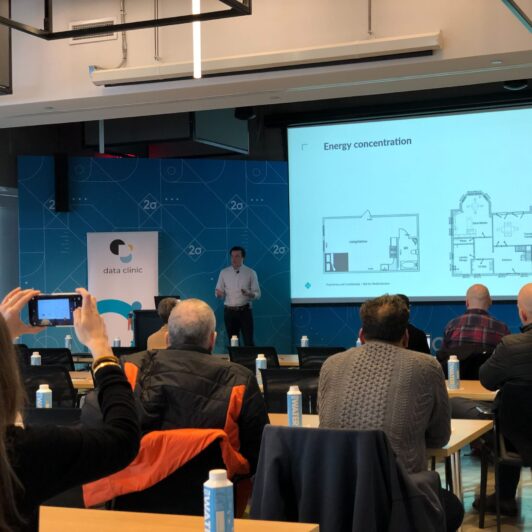40% of Americans can’t afford a $400 emergency. NeighborShare was founded in 2020 to leverage technology and peer-to-peer giving to get people the financial assistance they need when they need it. When Two Sigma Data Clinic began working with NeighborShare in 2022, their organization had already expanded to 26 states, built a network of over 60 nonprofit partners, and made a significant impact in communities across the United States. While this expansion was exciting, it also brought with it some notable growing pains. The Data Clinic team was engaged to help NeighborShare streamline their current set of tools so that they could have one platform—rather than a disjointed set of tools and manual processes—to keep track of information on both partners and community needs.
NeighborShare provides a platform for nonprofits to post their clients’ pivotal, one-time needs and connect with donors who can fill them. They partner with local nonprofit organizations, such as food banks and women’s shelters, that are already embedded within communities and are intimately familiar with their neighbors’ needs: a recently unhoused family receives a sudden $350 car repair bill they can’t afford, or a young dad who needs $150 for a security guard certification so he can begin earning money for his family.
Establishing a source of truth for all of NeighborShare’s data
When we first started working with Neighborshare, they had a disparate set of platforms for managing their data. “We had an amazing group of volunteers who put together a robust onboarding process for our nonprofit partners last year,” said Kelli Kreps, executive director. “Because speed and cost were the top considerations, we ended up with a successful, yet very manual and time-intensive process.”
Simple tasks, such as recording that a need had been filled, required manual copying data from one platform to another. Additionally, many of the workflows had been developed with other engineers in mind, so the administrators, who were not trained software engineers, had to run cloud scripts, handcraft JSON files, and perform manual operations on the database.

The ultimate goal of our partnership was to build a consolidated and permission-restricted tool that would allow NeighborShare to collect and review data; manage actions, such as partner onboarding; and update needs as they were filled. For the first step of this project, we aimed to create a read-only platform. This tool would display information about partner organizations, donation statuses, and community member needs using Next.js (a React framework) and Supabase.
The initial goals of the project required flexibility due to NeighborShare’s early stage growth. “As with any startup, the goals, direction, and even tech stack shifted quite a bit in the early days,” Kreps said. “Having a partner that not only understands that reality, but can bend and flex with you through that process is invaluable. Our Data Clinic partners were the best. Always there with smiles, good questions, and ultimately solutions.”
Having a partner that not only understands [the reality of a startup], but can bend and flex with you through that process is invaluable. Our Data Clinic partners were the best. Always there with smiles, good questions, and ultimately solutions.
It was really important for us to consider NeighborShare’s size and capacity when proposing sustainable solutions. We wanted to make sure their team would be able to confidently manage the product beyond the duration of our partnership, and that the solution could support NeighborShare as it grew.
One example of these complicated considerations was choosing a database management system. Initially, NeighborShare wanted to migrate from Hasura to another provider, but because they rely on a lean, primarily volunteer team of engineers, doing a full database migration was either too time intensive and risky, or too expensive, depending on the provider. Ultimately, we collectively decided to work within their existing suite of solutions, and opted to retain Hasura. During this analysis, we discovered that partner data was stored across multiple platforms in addition to Hasura. The problem became not just storing data, but establishing a source of truth to keep track of where every part of partner data was kept. The team now uses Supabase as an authoritative central repository that tells users the location of a partner’s data across NeighborShare’s services.
Setting NeighborShare up for future success
In addition to adapting our tech stack decisions to NeighborShare’s current growth stage, we also deliberately chose to sequence development in a way that would best position their team for sustainable future development of the admin portal. As such, the plan for phase one was to create a read-only app to address the crucial need for a data source of truth. However, the need to have a way to automate the uploading of needs, stories, and partner information remained pressing.
Through our scoping discussions with the NeighborShare team, we discovered that the biggest pain point in their organizational workflows was onboarding new partners. The onboarding process involved collecting important documents, such as audits, via email and these documents were then manually uploaded by someone on the NeighborShare team. It involved lots of back and forth, with many partners dropping out during the lengthy process, so it was critical that this problem be addressed as promptly as possible.

To facilitate this eventual functionality, our team built the “read only” app with a special focus on making it modular to allow for the easy extension of the project. With this approach, NeighborShare could later add features to automate the onboarding process and inputting of data. The new admin app completed by Data Clinic allows NeighborShare to see information about their partner organizations and different people’s needs all in one place. “I can’t say enough about how Data Clinic has helped us build toward a truly scalable model,” Kreps said. “As a startup you’re always bootstrapping, and the sophistication and automation Data Clinic brings is positioning us for significant growth and new partnerships.”
The next phase of this project is to extend the functionality of the read-only app to address more of NeighborShare’s most important operational workflows. Data Clinic engineers are already beginning to extend the admin application for both partner organizations and NeighborShare administrators to log in, approve partners, and add family stories and needs. We’re very excited for the next phase of development with NeighborShare.
A special thanks to Megan Rochlin for authoring this blog post.






